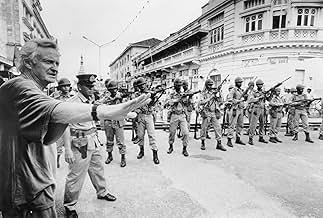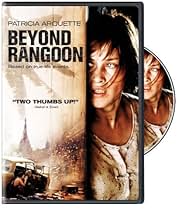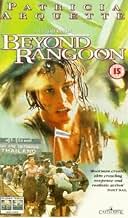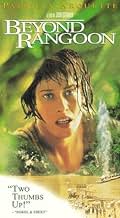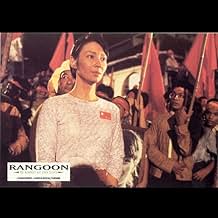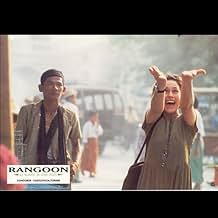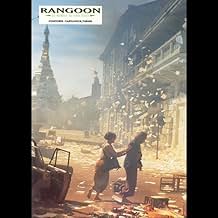NOTE IMDb
6,5/10
5,6 k
MA NOTE
Ajouter une intrigue dans votre langueAn American tourist finds herself in the middle of a political uprising in Burma.An American tourist finds herself in the middle of a political uprising in Burma.An American tourist finds herself in the middle of a political uprising in Burma.
- Réalisation
- Scénario
- Casting principal
- Récompenses
- 2 victoires et 3 nominations au total
Kuswadinata
- Colonel at Hotel
- (as Kuswadinath Bujang)
Avis à la une
Patricia Arquette plays American doctor Laura Bowman, who takes a holiday to Burma in an attempt to heal her spirit after the murders of her husband and young son. She is left behind in Rangoon during a military crackdown and leaves the city with an aging man who works as a "tour guide." But he is no simple tour guide; he is a professor who introduces her to the life outside of the tourist traps ... the two of them get caught up in the political upheaval and Laura sees with her own eyes how the government betrays and oppresses its own people.
This movie is one of my favorites because of its themes. First, it's informational (describing some of the injustices that are occurring in Burma). Secondly, it's about a woman's struggle to find meaning in life after an incredible loss. Thirdly, it's about compassion and sacrifice, and people coming together - without even knowing each other - to endure pain and fear.
Just about every beautiful scene in this movie is important; nothing is wasted here. It's an earnest and moving film. There is also a very emotional score composed by Hans Zimmer which complements scenes nicely.
A definite recommend, especially to people concerned with human rights ... and people who want to know, "What purpose can I serve?"
This movie is one of my favorites because of its themes. First, it's informational (describing some of the injustices that are occurring in Burma). Secondly, it's about a woman's struggle to find meaning in life after an incredible loss. Thirdly, it's about compassion and sacrifice, and people coming together - without even knowing each other - to endure pain and fear.
Just about every beautiful scene in this movie is important; nothing is wasted here. It's an earnest and moving film. There is also a very emotional score composed by Hans Zimmer which complements scenes nicely.
A definite recommend, especially to people concerned with human rights ... and people who want to know, "What purpose can I serve?"
When an American tourist comes to Burma with her sister to try and move on from the murder of her husband and son. However a midnight walk brings her into the middle of a student demonstration where she loses her passport. Left behind by her tour group she begins tour of discovery through the troubled country led by U Aung Ko. She discovers a world of atrocities that have not been exposed to the media.
There's no denying that there is a great story here it is a powerful tale of injustice, military rule and massacres that happened away from the public eye. However this film does not really tell that story. Instead it focuses on an American doctor on holiday in Burma who allows us to see all these things. However it comes across like it's about her rather than the country. She is seen as the most important character and we have a subplot about her overcoming the loss of her family in the US. It takes away from the central story and makes this feel like a soap.
Of course it needn't have been like that. It's only a terrible, flat, lifeless performance from Arquette that does this. She is so flat that it's hard to care about her and it comes across even more like a soap. She gives us shock, self-righteous indignation etc all under a monotone voice over than made me want to sleep. She manages to come across as more important than everyone else in the country and it's as she only sees events in terms of how they affect her. Outside of Arquette the support cast are good U Aung Ko in particular, but McDormand and Grey are OK.
The film continues with Hans Zimmer's standard `Far East' score (compare this to Black Rain to see what I mean) and Arquette discovering herself and spuing philosophy everywhere. However at the end the film acts as a metaphor for why the US didn't know about events in Burma because no one cares about massive deaths unless a Westerner is involved. We see in on the news everyday hundreds killed in a third world country is relegated to the end of the news, after a story about what Brittany was wearing that day! But if one American was killed then it would be the lead story with politicians running from all corners to comment on it.
The film manages to take a terrible, emotive story and make it into a beautifully shot drama about one American woman who only sees things in terms of how they affect her. Boorman has a good try but really needed a much better actress to lift the script.
There's no denying that there is a great story here it is a powerful tale of injustice, military rule and massacres that happened away from the public eye. However this film does not really tell that story. Instead it focuses on an American doctor on holiday in Burma who allows us to see all these things. However it comes across like it's about her rather than the country. She is seen as the most important character and we have a subplot about her overcoming the loss of her family in the US. It takes away from the central story and makes this feel like a soap.
Of course it needn't have been like that. It's only a terrible, flat, lifeless performance from Arquette that does this. She is so flat that it's hard to care about her and it comes across even more like a soap. She gives us shock, self-righteous indignation etc all under a monotone voice over than made me want to sleep. She manages to come across as more important than everyone else in the country and it's as she only sees events in terms of how they affect her. Outside of Arquette the support cast are good U Aung Ko in particular, but McDormand and Grey are OK.
The film continues with Hans Zimmer's standard `Far East' score (compare this to Black Rain to see what I mean) and Arquette discovering herself and spuing philosophy everywhere. However at the end the film acts as a metaphor for why the US didn't know about events in Burma because no one cares about massive deaths unless a Westerner is involved. We see in on the news everyday hundreds killed in a third world country is relegated to the end of the news, after a story about what Brittany was wearing that day! But if one American was killed then it would be the lead story with politicians running from all corners to comment on it.
The film manages to take a terrible, emotive story and make it into a beautifully shot drama about one American woman who only sees things in terms of how they affect her. Boorman has a good try but really needed a much better actress to lift the script.
"The trip was Andy's idea. It was easier to say 'Yes' than argue. Always that way with my sister. She meant well. A touch of the exotic east would take me away from everything that reminded me of what had happened..."
So begins the film "Beyond Rangoon", about an emotionally troubled American who is urged by her sister to take a vacation in Rangoon, Burma to try and get over the devastating loss of her husband and child. While there, she becomes entertwined in very real political upheavel. The film depicts the marches and rallies and protests realistically, and shows massacres that are hard to watch, but need to be heard. The political upheavals that really happened in Burma in 1988 were never heard or talked about in the US, and needed to be. Aung San Su Kyi was a woman who was trying to bring Burma (Now Myanmar) to democracy, but was denied by the government. She still tried to lead her people to freedom, and the struggle still exists today. The film has powerful writing, directing, cinematography and acting. The absolutely chilling and powerful score by Hans Zimmer lends riveting power to each scene, and fills triumphant moments with triumph. Patricia Arquette portrays the American, Laura Bowman, with depth, very frozen by the horrors of her loss, "I tried finding something in those stone statues, but nothing stirred in me. I was stone myself", but slowly she sees the meaning of her life and others in her journeys throughout Rangoon and beyond. A terrific film. And it needs to be watched. At home, and in history or government classes. **** stars.
So begins the film "Beyond Rangoon", about an emotionally troubled American who is urged by her sister to take a vacation in Rangoon, Burma to try and get over the devastating loss of her husband and child. While there, she becomes entertwined in very real political upheavel. The film depicts the marches and rallies and protests realistically, and shows massacres that are hard to watch, but need to be heard. The political upheavals that really happened in Burma in 1988 were never heard or talked about in the US, and needed to be. Aung San Su Kyi was a woman who was trying to bring Burma (Now Myanmar) to democracy, but was denied by the government. She still tried to lead her people to freedom, and the struggle still exists today. The film has powerful writing, directing, cinematography and acting. The absolutely chilling and powerful score by Hans Zimmer lends riveting power to each scene, and fills triumphant moments with triumph. Patricia Arquette portrays the American, Laura Bowman, with depth, very frozen by the horrors of her loss, "I tried finding something in those stone statues, but nothing stirred in me. I was stone myself", but slowly she sees the meaning of her life and others in her journeys throughout Rangoon and beyond. A terrific film. And it needs to be watched. At home, and in history or government classes. **** stars.
This movie was working toward two goals: to make a political point and to tell a scary adventure story. It's often difficult to do make a political point and still tell a good story (consider the highly political but rarely-entertaining final season of Ellen). Beyond Rangoon finds a good balance between politics and storytelling.
I already knew that Aung San Suu Kyi had won the 1991 Nobel Peace Prize, and knew something about the oppressive political situation in Burma, so the political message of the movie was mostly a dramatization of what I already knew. But I thought the movie did a good job of telling about Aung San Suu Kyi and the mostly-faceless dictators who have for years tried to silence her. The device of presenting an unfamiliar setting through the eyes of a character that viewers can identify with is fairly common, but it's quite well done in this movie.
Of course, the real measure of the movie was its entertainment value. Arquette was excellent as a young woman whose sister took her to a distant, unfamiliar place to shake her out of her depression over the violent deaths of her husband and son. She is convincingly detached and depressed. Her grieving condition gives her a clear reason for her distracted wanderings into the thick of a dangerous situation she does not understand, something she'd otherwise be much too intelligent to stumble into.
Once the dangers become so obvious that she can see through them even through the cloud of grief, she's trapped, with no easy escape. That sets her on a path of adventure where she needs her intelligence to survive. The writers deserve much credit for making her intelligent and resourceful enough to deal with numerous dangerous situations, while still finding a plausible reason for her to be foolish enough to get into trouble in the first place. The directing is strong also, keeping up the tension throughout the race to escape the forces of the dictatorship.
This movie had additional impact on me and my wife because of other events of the same time period. We were preparing for a trip to India, and heard news reports of Western tourists who had been taken hostage by a terrorist group in India. Avoiding isolated terrorists in a peaceful democratic country is quite a different matter from escaping an oppressive dictatorship. But the movie and the news shared the element of avoiding danger in an unfamiliar country. That common characteristic gave the movie meaning beyond the strength of its own skillful storytelling. The movie illustrates the international tourist's worst nightmare.
I already knew that Aung San Suu Kyi had won the 1991 Nobel Peace Prize, and knew something about the oppressive political situation in Burma, so the political message of the movie was mostly a dramatization of what I already knew. But I thought the movie did a good job of telling about Aung San Suu Kyi and the mostly-faceless dictators who have for years tried to silence her. The device of presenting an unfamiliar setting through the eyes of a character that viewers can identify with is fairly common, but it's quite well done in this movie.
Of course, the real measure of the movie was its entertainment value. Arquette was excellent as a young woman whose sister took her to a distant, unfamiliar place to shake her out of her depression over the violent deaths of her husband and son. She is convincingly detached and depressed. Her grieving condition gives her a clear reason for her distracted wanderings into the thick of a dangerous situation she does not understand, something she'd otherwise be much too intelligent to stumble into.
Once the dangers become so obvious that she can see through them even through the cloud of grief, she's trapped, with no easy escape. That sets her on a path of adventure where she needs her intelligence to survive. The writers deserve much credit for making her intelligent and resourceful enough to deal with numerous dangerous situations, while still finding a plausible reason for her to be foolish enough to get into trouble in the first place. The directing is strong also, keeping up the tension throughout the race to escape the forces of the dictatorship.
This movie had additional impact on me and my wife because of other events of the same time period. We were preparing for a trip to India, and heard news reports of Western tourists who had been taken hostage by a terrorist group in India. Avoiding isolated terrorists in a peaceful democratic country is quite a different matter from escaping an oppressive dictatorship. But the movie and the news shared the element of avoiding danger in an unfamiliar country. That common characteristic gave the movie meaning beyond the strength of its own skillful storytelling. The movie illustrates the international tourist's worst nightmare.
In the 90's, the American doctor Laura Bowman (Patricia Arquette) travels to Burma (presently Myanmar) with her sister and also doctor Andy Bowman (Frances McDormand) to recover from the loss of her beloved husband and son that were murdered in a theft at home. Laura sees a political pro-democracy manifestation to support the leader Aung San Suu Kyi and she decides to participate; however she loses her passport and she is not allowed to leave Rangoon.
While waiting to have another flight, Laura meets the unofficial tourist guide U Aung Ko, who is also a leader of an underground movement, and she decides to visit the countryside of Burma. However, the military dictatorship represses the movement and Laura, U Aung Ko and several civilians try to escape to Thailand in a dangerous journey.
"Beyond Rangoon" is an underrated film that has not aged, with top-notch performance of the gorgeous Patricia Arquette, I saw this film twice on VHS in the 90's and it is amazing that the military dictatorship still does exist in this country.
In accordance with the statement of John Boorman in the Extras of the DVD, the dramatic scene when the commander orders to shoot the politician Aung San Suu Kyi did really happen. Aung San Suu Kyi won the 1991 Nobel Peace Prize and shamefully was only released from house arrest on 13 November 2010. My vote is eight.
Title (Brazil): "Muito Além de Rangum" ("Far Beyond Rangoon")
While waiting to have another flight, Laura meets the unofficial tourist guide U Aung Ko, who is also a leader of an underground movement, and she decides to visit the countryside of Burma. However, the military dictatorship represses the movement and Laura, U Aung Ko and several civilians try to escape to Thailand in a dangerous journey.
"Beyond Rangoon" is an underrated film that has not aged, with top-notch performance of the gorgeous Patricia Arquette, I saw this film twice on VHS in the 90's and it is amazing that the military dictatorship still does exist in this country.
In accordance with the statement of John Boorman in the Extras of the DVD, the dramatic scene when the commander orders to shoot the politician Aung San Suu Kyi did really happen. Aung San Suu Kyi won the 1991 Nobel Peace Prize and shamefully was only released from house arrest on 13 November 2010. My vote is eight.
Title (Brazil): "Muito Além de Rangum" ("Far Beyond Rangoon")
Le saviez-vous
- AnecdotesSpalding Gray had previously been in another film about a South East Asian conflict: "The Killing Fields" (1984), which documented the genocide from the Khmer Rouge in Cambodia.
- GaffesWhen Patricia Arquette arrives at the railroad station, a train is standing on the track nearest the platform. When she runs to get on the train, it is just pulling in to the station.
Meilleurs choix
Connectez-vous pour évaluer et suivre la liste de favoris afin de recevoir des recommandations personnalisées
- How long is Beyond Rangoon?Alimenté par Alexa
Détails
Box-office
- Budget
- 23 000 000 $US (estimé)
- Montant brut aux États-Unis et au Canada
- 5 750 110 $US
- Week-end de sortie aux États-Unis et au Canada
- 2 007 527 $US
- 27 août 1995
- Montant brut mondial
- 5 750 110 $US
- Durée1 heure 40 minutes
- Couleur
- Mixage
- Rapport de forme
- 2.39 : 1
Contribuer à cette page
Suggérer une modification ou ajouter du contenu manquant


